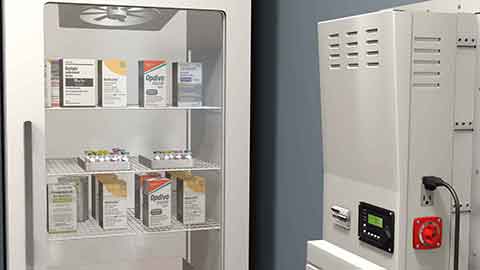How to Handle Vaccines Stored in Freezers
The conversation around cold chain management and proper storage and handling of pharmaceuticals has, understandably, been at the forefront over the last two years due to the rapid development and distribution of COVID-19 vaccines worldwide—of which there are currently 10 approved under emergency use authorization by the World Health Organization(WHO).
Improper vaccine storage; that is, allowing them to become either too hot or too cold, poses a major problem in regards to the effectiveness of the vaccine as well as puts unnecessary strain on already challenged vaccine supply chains.
Though most vaccines can be stored at standard refrigerator temperatures—2°C-8°C (36°F-46°F)—in relatively easy fashion, others have more unique temperature requirements and therefore, more specialized equipment is required to maintain their proper storage temperatures. Temperatures for these freezers usually fall between -50°C to -15°C (-58°F to 5°F). As room temperature is defined at ~20°C (68°F), ensuring proper storage is of the utmost importance, as exposure to such relatively warm temperatures can lead vaccines to rapidly become unusable.
Which Vaccines are stored Frozen?
In the United States, two of the most popular and widely distributed coronavirus vaccines (Moderna and Pfizer-BioNTech), require storage at temperatures far below freezing (-50°C to -15°C for Moderna and (-90°C to -60°C for Pfizer, respectively).
However, these vaccines are neither the only nor the first ones with wide distribution that require sub-zero temperatures in order to be properly stored.
In fact, in addition to the two previously mentioned, some of the most commonly used vaccines must be stored freezing temperatures to maintain efficacy. Among these, are:
MMR(b) (Measles, Mumps, Rubella)
Requires storage temperatures between -50°C to +8°C (-58°F to 46°F) in order to maintain potency.
MMRV(b) (Measles, Mumps, Rubella, Varicella)
Requires storage temperatures between -50°C to -15°C (-58°F to 5°F) in order to maintain potency.
Varicella(b) (Chickenpox)
Requires storage temperatures between -50°C to -15°C (-58°F to 5°F) in order to maintain potency.
Spikevax (Moderna Covid-19)
Requires storage temperatures between -50°C and -15°C (-58°F and 5°F) ) in order to maintain potency.
Comirnaty (Pfizer-BioNTech COVID-19)
Requires ultra-cold freezer storage between -90°C and -60°C (-130°F and -76°F) in order to maintain potency.
What is the best way to store frozen vaccines?
Per the Storage and Handling Toolkit, the CDC recommends that it is crucial you store vaccines in:
“Purpose built or pharmaceutical-grade [storage] units designed to either refrigerate or freeze”.
While consumer-oriented, household-grade units are an acceptable alternative for vaccine refrigeration under the right conditions; they specifically exclude using the freezer compartment of these units as they’re not recommended for storage purposes.
Additionally, one should NEVER use a bar or dormitory-style combined freezer/refrigerator unit; they are designed in such a way that any vaccines needing refrigeration are at an increased risk of becoming frozen, while their limited power outputs mean vaccines that need freezing won't be held at a cold enough temperature.
To protect patients from inadvertently receiving spoiled vaccine and to protect your facility from vaccine replacement, a stand-alone storage unit specifically used for frozen vaccines should be used to always handle them. For example, if you purchase unit meeting NSF-456 storage standards, it’s sure to be able to meet these requirements.
Some other best practices laid out by the CDC in the same Storage and Handling Toolkit include:
- Purchasing vaccine storage units with enough space to accommodate your full inventory during busy periods without overcrowding—think flu season. Also make sure to leave 2-3 inches between the vaccine containers and freezer walls. This will allow air to properly circulate inside the machine and maintain frozen vaccine temperature.
- Using door alarms or other safeguards to ensure proper sealing of the storage units. The CDC states that the most common reason for vaccine waste is due to doors being left open. This leads to temperature excursions, and vaccines needing to subsequently be thrown out due to improper temperature storage.
- Placing the unit in a well-ventilated room with plenty of space for proper air circulation; allowing for proper spacing between the unit and the walls, ceilings and other appliances or counters.
- Use water bottles stored inside the freezer to help maintain consistent temperature for when the door is consistently opened.
How Can I Make Sure My Vaccines Stay Frozen in an Emergency?
While we’ve already covered what to do with your refrigerated vaccines if your facility experiences a power outage, frozen vaccines pose a different challenge. Merely storing these vaccines in a cooler or on ice will cause them to fall well outside the temperature range necessary to prevent degradation. A great first step is ensuring your freezer has a temperature monitoring device to make sure you can keep accurate data on your stock, emergency or not.
The best way to make sure your vaccines STAY at their necessary temperature is with a backup power solution. A rechargeable battery backup power unit is a perfect tool for achieving this goal—especially a Medi-Products unit.
Modular design means they can be built for exactly as much energy as you’ll need to power your freezer; they activate automatically so no one needs to be on-site to start a generator; and with a power alert system, you can be notified remotely when your power goes out and backup unit is operational as well as when the batteries have been depleted.
This kind of system takes any guesswork out of figuring out how to maintain proper temperatures, allows for resources to be used for more critical issues that can occur during an outage, and ultimately saves the facility the expense of replacing costly vaccines especially ones from VFC programs; making sure you can still use your entire arsenal until they finally reach their expiration dates.


